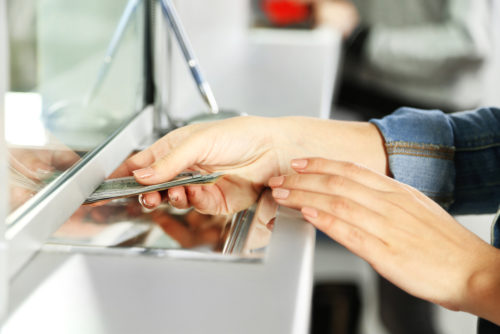Yes, you can withdraw cash from your credit card. This is called a “cash advance.” It can be risky, and might not be the best option for you, but sometimes life doesn’t leave you much of a choice. If you’re in a tight spot and considering a cash advance, make sure you know exactly what that will entail with fees and interest. In this article, we’ll cover what a cash advance is, how to get one, and how much it will cost you.
Table of Contents
What Is a Cash Advance on a Credit Card?
A cash advance on a credit card is when you use your credit card at an ATM (or bank counter) to withdraw cash from the credit account. Most banks and financial institutions allow you to withdraw up to a limited amount of cash from your available line of credit. But unlike a debit card withdrawal, which pulls from your own money, a cash advance is borrowed money. Instead of that money being used to pay for a transaction (a normal credit card charge), a cash advance simply charges your account and gives you access to cash.
How to Get a Cash Advance on a Credit Card
First, check the agreement that you received with your credit card. That should tell you the APR rate and fees associated with a cash advance. Also check your statement for a cash advance limit or call the customer service number on the back of your card for this information.
You should have received (or set up) a pin number for your credit card when you signed up for it. Simply use your card at an ATM to receive your cash advance, the same way you would withdraw cash from your debit card. Unlike a debit card, however, you can’t ask for cash back from a retailer or sales clerk when you are checking out. This won’t even be an option on the keypad you use to run your credit card — you’ll have to go to an ATM or bank to run a cash advance transaction.
Why You Shouldn’t Get Cash Advances on Your Credit Card
Getting a cash advance on your credit card is expensive and risky. The interest rate on a cash advance is usually much higher than the regular interest rate for purchases made with your credit card. There are also other fees attached and effects it could have on your credit. If you decide a cash advance is your only option and you must go through with it, here are a few things to consider:
Credit Card Cash Advance Fees
Your credit card agreement will show the exact fees associated with a cash advance. The fee amount varies depending on which card you choose but often start at $10 or 5 percent of the cash advance amount, whichever amount is greater. Because a cash advance isn’t like a normal transaction, there isn’t a merchant paying a fee to run your card. Instead, you have to pay more upfront to cover the transaction yourself.
Credit Card Cash Advance APR/Interest
This is where the fees on a cash advance can really hit you hard. APR and interest fees on cash advances are usually much greater than the usual interest rate on your credit card. Again, check your agreement or check with your bank for your exact rate. Additionally, most cash advances don’t allow for a grace period, so interest will start accruing immediately.
Out of Network ATM Fees
You might already know that using an ATM that is not associated with your bank will cost you an extra fee of anywhere from $2 up to $6, but the exact amount depends on the ATM you choose. This is a good reason to try and only use ATMs associated with your bank. This fee tacked onto the advance fee and the interest you’ll end up paying later make a simple cash advance very expensive.
Effect On Your Credit Score
Taking out a cash advance will not impact your credit score. However, your credit score will drop if the cash advance is not paid back immediately. Technically, using a cash advance to pay for an unexpected bill could help your credit score as long as it’s paid back immediately. But when you consider the fees and extra interest you’ll pay on the advance, it’s usually not worth the risk.
Getting Cash Back From a Credit Card
A cash advance is not the same as cash back — cash back is a common name for a credit card rewards program. Getting a cash advance on your credit card is risky but cash back is one of the perks of owning a credit card. Many credit card issuers will offer a reward in the form of cash back once a year. Depending on your agreement, you may get a small percentage back on the purchases made with your credit card.
For example, your card might offer one percent cash back on all gas and grocery transactions. Some cards may offer other forms of rewards, too, like travel miles or money towards a purchase in a specific store. If you use your card wisely, these cash back rewards can really add up. Getting cash back rewards isn’t quite as fast or simple as getting a cash advance, but it is important to understand the difference between these two similar-sounding terms.
Depending on your credit card agreement, you can usually get cash from your credit card with an advance. The process is simple, but you have to watch out for fees and high interest rates as well as possible negative effects to your credit if the loan is not paid back immediately. However, this could be a good option in a pinch. Advance at your own risk!
Image Source: https://depositphotos.com/





